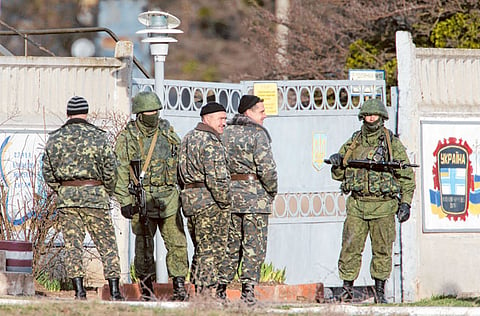Crimea votes to join Russia
Divided EU set to warn, not sanction Russia at summit

Simferopol: Crimea’s parliament voted to join Russia on Thursday and its Moscow-backed government set a referendum within 10 days on the decision in a dramatic escalation of the crisis over the Ukrainian Black Sea peninsula.
The sudden acceleration of moves to bring Crimea, which has an ethnic Russian majority and has effectively been seized by Russian forces, formally under Moscow’s rule came as European Union leaders gathered for an emergency summit to seek ways to pressure Russia to back down and accept mediation.
The Crimean parliament voted unanimously “to enter into the Russian Federation with the rights of a subject of the Russian Federation”.
The vice premier of Crimea, home to Russia’s Black Sea military base in Sevastopol, said a referendum on the status would take place on March 16. He said all state property would be “nationalised” and the Russian rouble could be adopted.
The announcement, which diplomats said could not have been made without Russian President Vladimir Putin’s approval, raised the stakes in the most serious east-west confrontation since the end of the Cold War. Russia stocks fell and the rouble weakened further after the news.
Far from seeking a diplomatic way out, Putin appears to have chosen to create facts on the ground before the West can agree on more than token action against him.
EU leaders had been set to warn but not sanction Russia over its military intervention after Moscow rebuffed Western diplomatic efforts to persuade it to pull forces in Crimea, with a population of about 2 million, back to their bases. It was not immediately clear what impact the Crimean moves would have.
European Commission President Jose Manuel Barroso said in a Twitter message: “We stand by a united and inclusive #Ukraine.” French President Francois Hollande told reporters on arrival at the summit: “There will be the strongest possible pressure on Russia to begin lowering the tension and in the pressure there is, of course, eventual recourse to sanctions.” The new Ukrainian government has declared the referendum illegal and opened a criminal investigation against Crimean Prime Minister Sergei Askyonov, who was appointed in a closed-door session by the region’s parliament last week. The Ukrainian government does not recognise his authority or that of the parliament.
Russian Foreign Minister Sergei Lavrov refused to meet his new Ukrainian counterpart or to launch a “contact group” to seek a solution to the crisis at talks in Paris on Wednesday despite arm-twisting by US Secretary of State John Kerry and European colleagues.
Tension was high in Crimea after a senior UN envoy was surrounded by a pro-Russian crowd and forced to get back on his plane and leave the country on Wednesday.
The EU summit in Brussels seemed unlikely to adopt more than symbolic measures against Europe’s biggest gas supplier, because neither industrial powerhouse Germany nor financial centre Britain is keen to start down that road.
The United States has said it is ready to impose sanctions such as visa bans, asset freezes on individual Russian officials and restrictions on business ties within days rather than weeks.
The short, informal EU summit will mostly be dedicated to displaying support for Ukraine’s new pro-Western government, represented by Prime Minister Arseny Yatseniuk, who will attend even though Kiev is neither an EU member nor a recognised candidate for membership.
After meeting European Parliament President Martin Schulz, Yatseniuk appealed to Russia to respond to mediation efforts.
The European Commission announced an aid package of up to €11 billion (Dh55 billion) for Ukraine over the next couple of years provided it reaches a deal with the International Monetary Fund, entailing painful reforms like ending gas subsidies.
Diplomats said that at most, the 28-nation EU would condemn Russia’s so far bloodless seizure of the Black Sea province and suspend talks with Moscow on visa liberalisation and economic cooperation, while threatening further measures if Putin does not accept mediation efforts soon.
They were expected to hold back from tougher steps both in hopes of a diplomatic breakthrough and out of fear of a tit-for-tat trade war with Russia, a major economic partner of Europe.
France has a deal to sell warships to Russia that it is so far not prepared to cancel, London’s banks have profited from facilitating Russian investment, and German companies have $22 billion invested in Russia.
Before the summit, European members of the Group of Eight major economies will meet separately, diplomats said, in an apparent effort to coordinate positions towards Russia, due to host the next G8 summit in Olympic venue Sochi in June. They have so far stopped participating in preparatory meetings and Canada has said G7 countries may meet soon without Russia.



